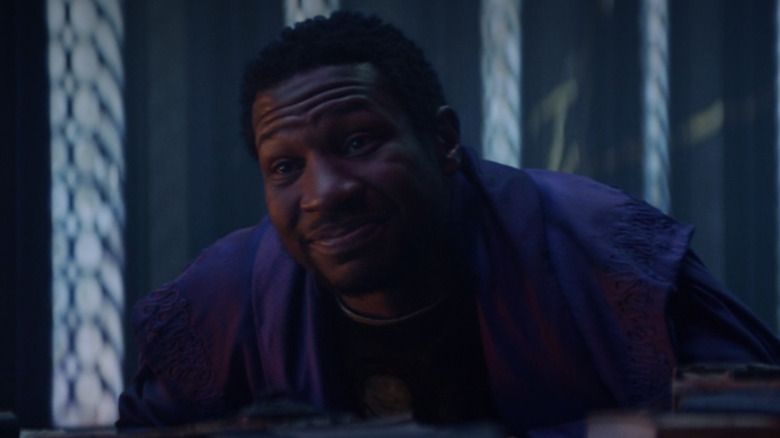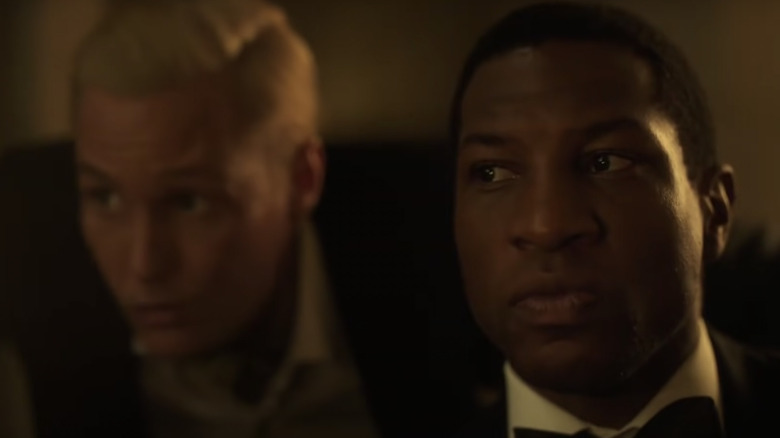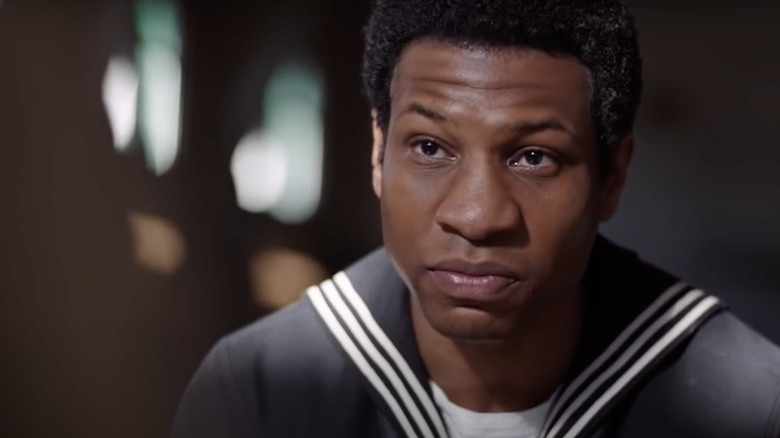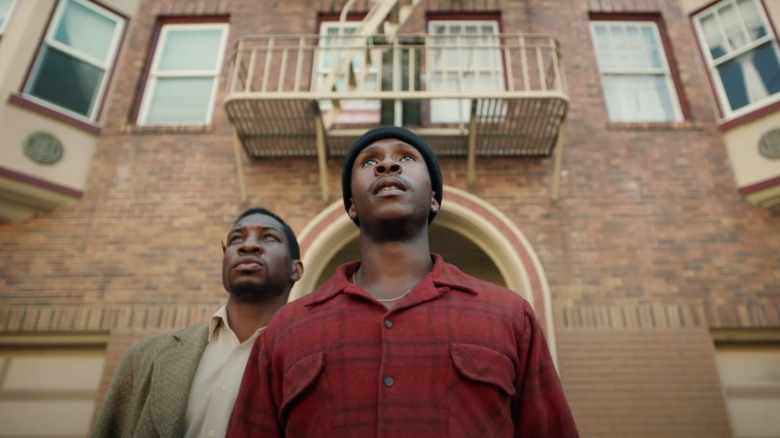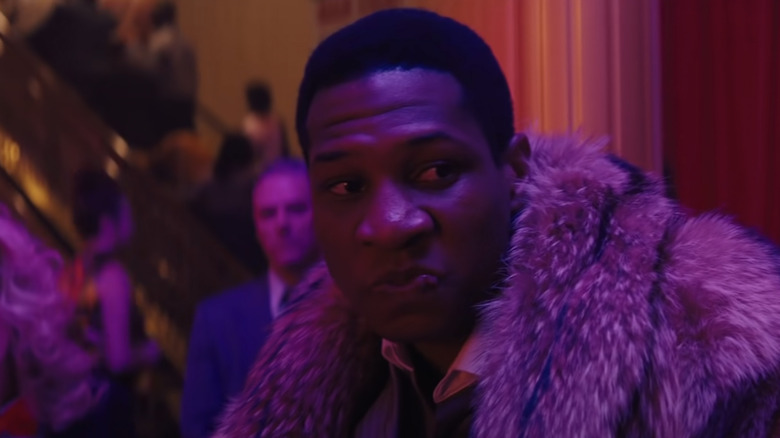Why He Who Remains From The Loki Finale Looks So Familiar
Contains spoilers for "Loki," Season 1, Episode 6: "For All Time. Always."
The "Loki" finale just blew up the MCU.
Not literally, though. Instead, we are now in full-on multiverse territory, as teased in "Avengers: Endgame" and "WandaVision." Eager Marvel fans have long-expected this, with "Spider-Man: No Way Home," "Doctor Strange in the Multiverse of Madness," and "Ant-Man and The Wasp: Quantumania" guaranteeing that we'll be seeing some major timeline shenanigans in MCU Phase Four.
"Loki," however, has finally shown us how the multiverse can exist. In the finale, we finally meet He Who Remains, a god-like figure who we discover created the TVA and is the true protector of the sacred timeline. This timeline is destroyed, though, when Sylvie, driven by revenge for being taken by the TVA as a child, kills He Who Remains, creating endless branches and truly cracking the multiverse wide open.
He Who Remains is played by the enormously talented Jonathan Majors. It was first reported by Deadline in September 2020 that Majors was cast as iconic Marvel villain Kang the Conquerer and would be appearing in "Ant-Man and The Wasp: Quantumania." In the comics He Who Remains and Kang the Conqueror are different characters, but the MCU has merged the two. As anyone who saw the episode can attest, Majors' performance as Kang in Loki was certainly scene-stealing, and his pervious performances are equally as captivating.
Jonathan Majors earned his first Emmy for his work on Lovecraft Country
Audiences will best know Jonathan Majors from his work on HBO's "Lovecraft Country," based on the novel of the same name by Matt Ruff. Majors plays Atticus Freeman, a young man traveling 1950s America in search of his missing father. Not only does Atticus have to overcome the fierce racism in Jim Crow-era America, but some terrifying monsters said to have inspired the iconic H.P. Lovecraft novels.
Lovecraft Country, which was cancelled by HBO prior to the production of Season 2, received critical acclaim, holding an aggregate Tomatometer score of 88% on Rotten Tomatoes. The show also has earned a very impressive 18 nominations at the 2021 Emmys, including Outstanding Drama Series, and Outstanding Lead Actor for Majors.
In a statement responding to the nominations, as reported by Indiewire, Majors said, "Thank you for seeing the light in the dark, and the smile in the tears of this character, Atticus Freeman, he is one of my best friends, and I'm glad you all got to meet him as well. Playing this role has changed my life, and this nomination is yet another growing and changing moment."
"Lovecraft Country" may have been Majors' breakout role, but the performer has shown his talents before.
The actor portrayed a famed LGBTQ activist
Jonathan Majors also starred in the 2017 ABC miniseries "When We Rise," a chronicled re-telling of the gay rights movement in the United States. Majors portrays a young version of real-life LGBTQ activist Ken Jones, an early advocate in preventing the spread of HIV, particularly among gay Black men. Michael K. Williams, best known for his role as Omar Little on "The Wire," played an older version of the famed activist (Majors and Williams also, notably, would go on to start together again on "Lovecraft Country").
As shared in an interview with W Magazine, Majors was in his final year at Yale School of Drama when shooting the series, having been personally selected by "When We Rise" showrunners Dustin Lance Black and Gus Van Sant for the role. On playing such an important figure in the gay rights movement, Majors shared, "My politics have become very clear, and they've come to the surface of who I am as a human being. It's so rare to do a piece where you don't have to separate your politics and your work and your art."
Majors starred in one of Barack Obama's favorite films
Jonathan Majors has also been praised for his work in A24 film "The Last Black Man in San Francisco." Another overtly political project, the film follows a young Black man's efforts to reclaim his childhood home in gentrified San Francisco. Written by and starring Jimmie Fails, it's a semi-autobiographical recount of Fails' own quest to overcome the devastating impacts of gentrification.
Majors stars as Montgomery Allen, Fails' best friend. The characters' bond is a key component of the story, and talking with The Hollywood Reporter, Majors shared that the actors connected off-screen, too. "There were deep things that were going on in [Fails'] life that we would just sit and have breakfast and talk about," Majors told THR. "Things that I've experienced, what it is to be young, gifted and black — or in my case, young, kind of gifted and black — issues [of] trying to be a young man in the world. He's my buddy, he's my best friend."
"The Last Black Man in San Francisco" premiered at the 2019 Sundance Film Festival, and earned director Joe Talbot both the U.S. Dramatic Directing Award and the Special Jury Award – Creator Collaboration. It holds a Metacritic score of 83, with the aggregate website calling it a "Must See." Barack Obama also named it as one of his favorite films of 2019 as well, certainly another high accolade for any filmmaker.
Majors starred as a successful kingpin
Audiences may also know Jonathan Majors from his work on "White Boy Rick." Starring Matthew McConaughey and set in 1980s Detroit at the height of the War on Drugs, the film follows a blue-collar father and his teenage son, Rick (Richie Merritt). Based on a true story, Rick becomes the FBI's youngest ever drug informant at age 14, and quickly finds himself immersed in the lucrative world of drug dealing.
Majors stars as Johnny Curry, a local kingpin who brings Rick into his fold of illegal activities. The actor talked to The Source about how much preparation went into playing the role, saying, "The film takes place in the 80's so I studied Black culture in the 80's, and also...the war on drugs, what people were talking about in the 80's, what people were afraid of during that time." Majors also shared how he hoped the film would challenge people's perception of drug dealers, calling his character "a leader of men." He elaborated, saying, "That's something we miss when we're dealing with African-American drug dealers. It's an occupation. He could be a lawyer or doctor and have the same attributes, it's just the fact that he's a drug dealer it's easy to write him off."
With his career still in its early stages and already having a slew of impressive roles behind him, Jonathan Majors is ready for more success. The ending of the first "Loki" season is just one sign of greater things to come for him.
